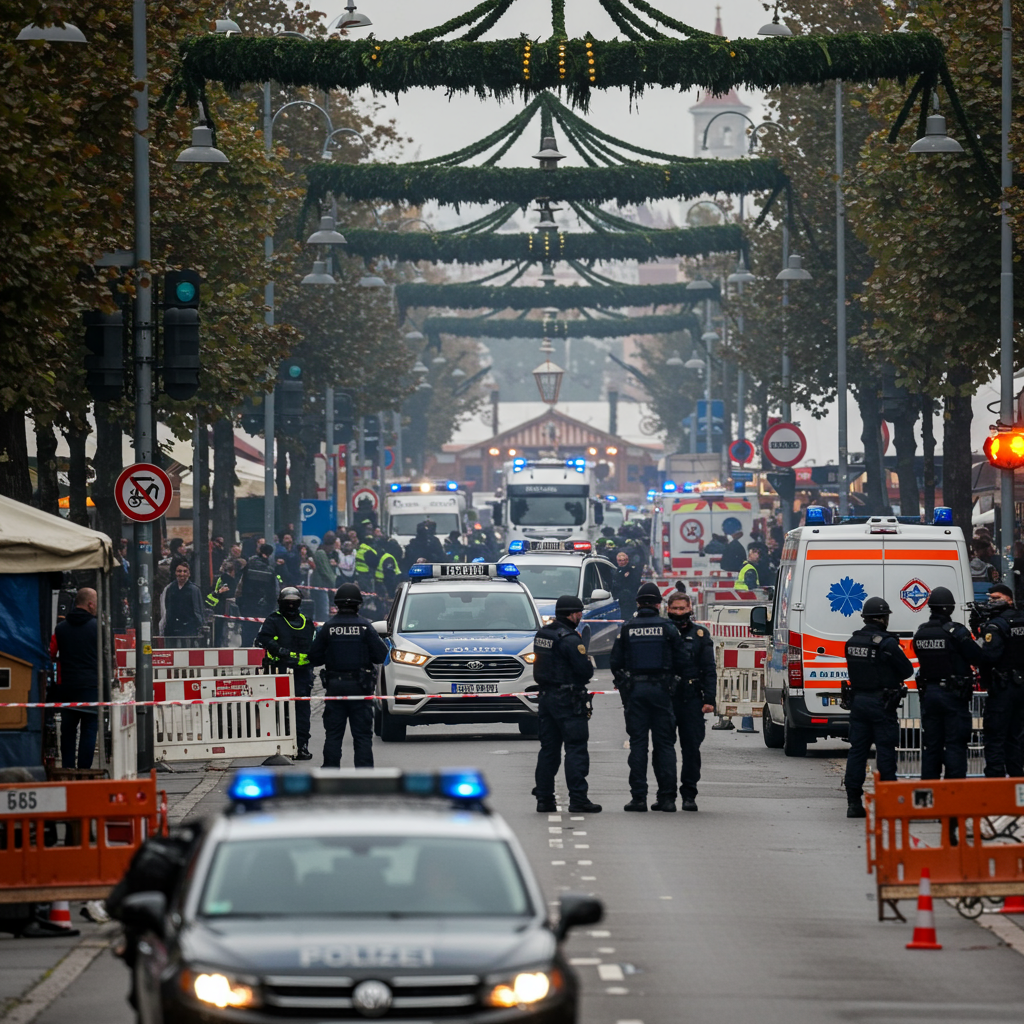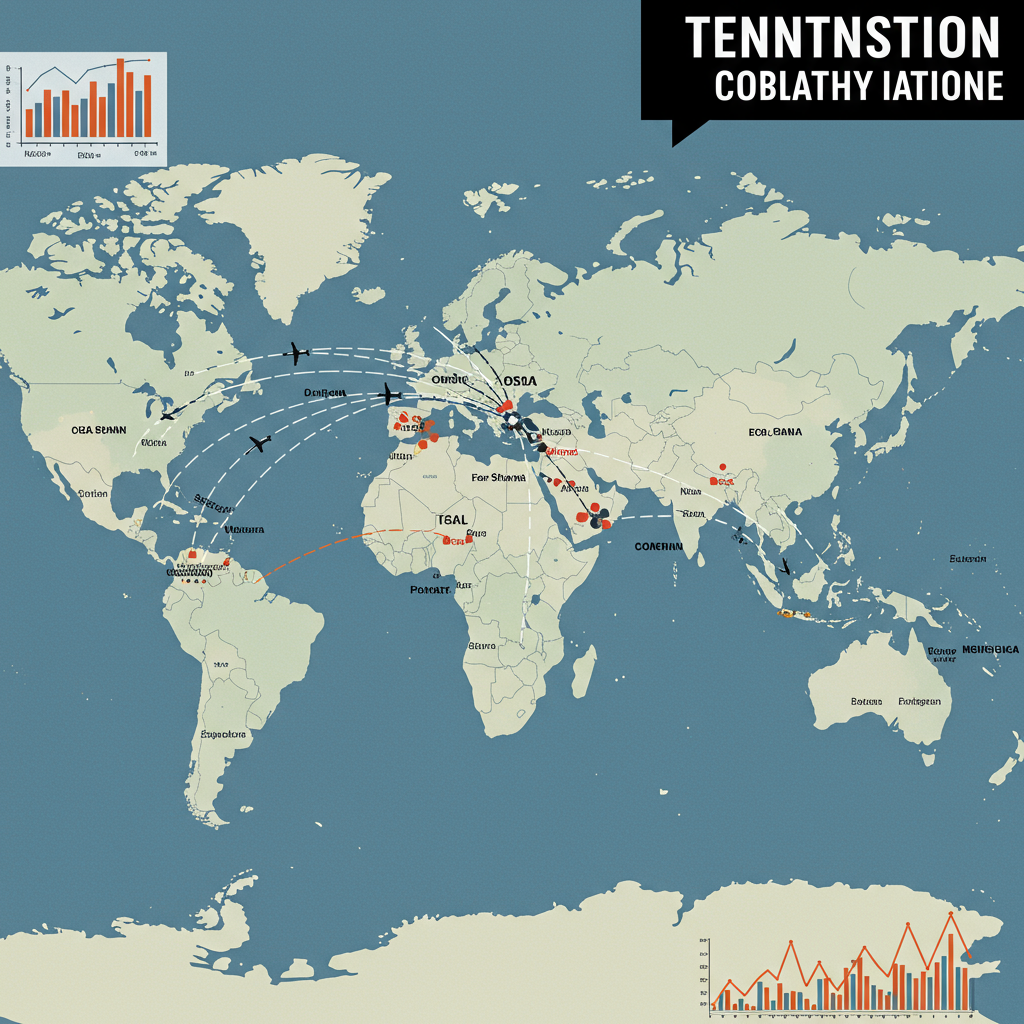Munich’s world-renowned Oktoberfest experienced an unprecedented temporary closure on October 1, 2025. This dramatic shutdown followed a serious bomb threat directly linked to a tragic domestic incident and fire in the city’s northern Lerchenau district. Authorities swiftly responded to the complex situation. Their prompt actions ensured the safety of visitors to the iconic beer festival. The incident highlighted the meticulous security protocols in place for major public events. It also underscored the challenging nature of modern threats.
Unraveling the Lerchenau Incident: A Family Tragedy Ignites Fear
The sequence of events began early Wednesday morning. Police and fire services responded to reports of a burning residential building. Loud bangs were also heard in the Lerchenau area. Investigations quickly revealed a devastating family dispute at the heart of the crisis. A 57-year-old German man allegedly set his single-family home ablaze. Family members were inside the property. He had also booby-trapped the residence with explosive devices. The suspect wounded his 81-year-old mother and 21-year-old daughter. Both victims were subsequently hospitalized for their injuries.
After these violent acts, the man fled the scene. He was later discovered near Lerchenauer See lake. He had taken his own life. Authorities found him with a backpack containing an explosive device. This device required immediate defusion by specialists. Investigators also confirmed “explosive traps” inside the burnt home. Additionally, explosives caused a Mercedes Sprinter van, belonging to the suspect, to catch fire and detonate. The suspect’s father is believed to have died inside the severely damaged building. Extreme heat prevented immediate recovery of his body. Bavarian Interior Minister Joachim Herrmann quickly stated that initial findings showed no signs of political motive or extremism. Instead, the family dispute appeared rooted in issues, including the suspect’s paternity of his daughter.
The Direct Link: An Unspecified Threat to Oktoberfest
A crucial development emerged during the investigation. Authorities discovered a letter written by the suspect. This letter contained an “unspecified threat of explosives related to Oktoberfest.” This discovery immediately escalated the local incident into a city-wide security concern. Given the timing, just hours before the festival’s scheduled opening, Munich officials acted decisively. The world-famous Oktoberfest fairgrounds were immediately cordoned off. They are located in the vast Theresienwiese public space.
Munich police spokesman Thomas Schelshorn confirmed the “major operation.” He explained that it had been underway since 4:45 a.m. Wednesday. He detailed the discoveries made at the Lerchenau site. These included the burning home, nearby burning cars, and the deceased man at Lerchenau Lake. Schelshorn explicitly stated the reason for the festival closure. It was due to the “unspecified threat of explosives for the Theresienwiese.”
Oktoberfest Shut Down: A Precautionary Measure
The temporary closure of Oktoberfest marked a significant precautionary measure. It prevented a potentially chaotic situation. Munich Police Deputy President Christian Huber clarified the decision. He noted that closure avoided a forced evacuation later if the threat solidified. Extensive searches were conducted across the festival grounds. Explosive detection dogs were deployed. These specialized units meticulously swept both inside and outside the large tents. Their mission was to ensure public safety.
The thorough security checks continued for several hours. This demonstrated the seriousness with which authorities viewed the threat. The disruption impacted thousands of eager visitors and vendors. However, public safety remained the top priority. The city’s emergency services were lauded for their rapid and intense response. Over 500 officers participated in the operation. This included a police helicopter that tracked the fleeing suspect.
Reopening and Reassurance: Festival Resumes
By mid-afternoon, investigative teams had thoroughly assessed the situation. They determined the threat was not genuine. No actual explosive devices or imminent danger were found on the festival premises. Following these reassurances, Oktoberfest resumed operations. The grounds officially reopened to the public at 5:30 p.m. local time. Munich’s Mayor Dieter Reiter confirmed the reopening. He assured the public there was no further cause for concern. Authorities also stated there was no indication of any threat at other Munich locations.
The swift resolution allowed the festival to proceed. This minimized long-term disruption. It showcased the robustness of Munich’s emergency response systems. The incident served as a stark reminder of the constant vigilance required for large-scale public events.
A Legacy of Security: Oktoberfest’s Enduring Resilience
Oktoberfest has a long history of facing security challenges. This has led to significantly tightened measures over the years. Permanent security fences now enclose the festival grounds. Strict bag restrictions are enforced. A heavy police presence is always visible. These measures reflect lessons learned from past incidents.
For example, a far-right extremist pipe bomb attack in 1980 killed 13 people. It injured over 200. A suspected Islamist plot was foiled in 2009. Heightened security followed a mass shooting in Munich in 2016. Authorities consistently treat Oktoberfest as a potential target. They understand the need for continuous adaptation of security protocols. The rapid and effective response to the 2025 bomb scare illustrates this dedication. It demonstrates a commitment to visitor safety.
Wider Context: Germany’s Vigilance
While the Oktoberfest incident unfolded, other significant national headlines emerged. Prosecutors in Berlin announced the arrest of three suspected Hamas operatives. They were accused of preparing violent acts. These included gathering firearms for assassinations targeting Israeli or Jewish institutions. Separately, Cologne’s Opera Hall complex was set for a delayed reopening. Its 14-year renovation project faced massive cost overruns. The German cabinet also held a retreat. It focused on a modernization plan to boost competitiveness and cut bureaucracy. These events collectively underscore a period of heightened security awareness and ongoing national developments in Germany. The ability to manage a major local crisis like the Oktoberfest threat amidst broader national concerns reflects a coordinated and resilient approach by German authorities.
The prompt police action in the Oktoberfest incident provided crucial reassurance. It allowed the iconic festival to continue. This demonstrated the robust security infrastructure in place.
Frequently Asked Questions
What exactly caused the Munich Oktoberfest closure on October 1, 2025?
The Munich Oktoberfest was temporarily closed due to a bomb threat. This threat was directly linked to a tragic domestic incident and fire in Munich’s northern Lerchenau district earlier that morning. A 57-year-old man had allegedly set his home ablaze, booby-trapped it with explosives, and later died by suicide. A letter found by authorities, written by the suspect, contained an “unspecified threat of explosives related to Oktoberfest,” prompting the immediate precautionary closure of the festival grounds.
When did Oktoberfest reopen, and what security measures were taken?
Oktoberfest reopened on Wednesday afternoon, October 1, 2025, at 5:30 p.m. local time. Prior to reopening, Munich police conducted extensive security checks across the entire Theresienwiese fairgrounds. These measures included cordoning off the area and deploying explosive detection dogs to thoroughly search both inside and outside the festival tents. The closure was a precautionary move to ensure no actual explosive devices were present before allowing public access.
Was there a political motive behind the Oktoberfest bomb threat?
No, preliminary investigations by Bavarian Interior Minister Joachim Herrmann indicated there were no signs of a political motive or extremism involved in the Oktoberfest bomb threat. The incident stemmed from a severe family dispute, including issues related to the suspect’s paternity of his daughter, for which he had reportedly filed petitions with city authorities. Authorities reassured the public that the threat was deemed not genuine after thorough searches, and there was no indication of wider danger.
Conclusion
The temporary closure of Munich’s Oktoberfest on October 1, 2025, represented a critical moment for public safety. It demonstrated the effectiveness of well-practiced emergency response protocols. The swift actions of Munich police and emergency services in linking a tragic domestic incident to a potential threat against the festival, coupled with immediate precautionary measures, prevented potential disaster. While disruptive, the incident showcased Munich’s unwavering commitment to visitor security at its world-famous events. The festival’s quick reopening, following exhaustive security sweeps, served as a powerful testament to the city’s resilience. It reinforced public confidence in the safety measures that protect one of Germany’s most celebrated cultural gatherings. Oktoberfest continues, bolstered by lessons learned and an enduring dedication to vigilance.




